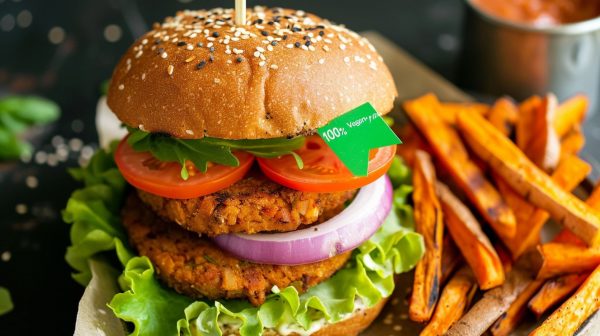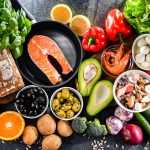Everyone loves the idea of eating a mostly plant-based diet. It’s healthy. It’s wholesome. It’s just downright good for you!
Whole, plant-based foods are great for your heart, blood pressure, metabolism and memory. They protect against age-related health conditions, and can work wonders for your waistline.
But there is a huge difference between the health effects of fresh whole foods that go from the farm to your table, and those that are ultra-processed for use in plant-based meat alternatives.
In a new study published in the American Journal of Clinical Nutrition, researchers compared the effect of meat consumption vs. plant-based meat alternatives on heart health and diabetes risk – what we call “cardiometabolic health.” And the results were eye-opening.
Over an eight-week period, plant-based meat alternatives were not associated with any improvement in cardiometabolic health compared to eating animal meat. This included no significant effects on lipid profiles, blood sugar, weight or other health outcomes measured.
In other words, any health effects normally associated with changing to more of a plant-based diet were not evident when it came to plant-based meat alternatives.
Now, compare those results with a wonderful study that came out of Stanford Medicine late last year.
In the 2023 study, researchers compared the cardiometabolic benefits of a meat-based diet against a true vegan diet. The great thing about it is that they used 22 pairs of identical twins. One twin in each pair ate a healthy omnivore diet; the other ate a healthy vegan diet.
After eight weeks, those on the vegan diet had lower blood pressure, better blood sugar levels, an improved lipid profile, and even lost a few pounds.
Big difference, right?
Not only that, but many of these plant-based substitutes are below daily requirements for calcium, potassium, magnesium, zinc and Vitamin B12 while they exceed the reference diet for saturated fat, sodium and sugar.
You might ask how that’s even possible.
Let’s Just Call Plant-Based Meat Alternative What They Are: Junk Food.
Here’s the deal.
Using terms like “plant-based” and “vegetable-based” paints a health halo around these foods that isn’t deserved. It’s an entirely new form of manipulation – making you think you’re getting something a lot healthier than it really is. And it is leading you down a dangerous path.
The fact is, plant-based meat alternatives are nothing more than ultra-processed junk food. They aren’t brimming with whole plant foods or veggies. There are no beans, greens, nuts, seeds or carrots in them.
You are much more likely to find words like soy or pea protein isolate, methylcellulose, calcium alginate, xanthan gum and other undecipherable stuff on the ingredient list.
This pretty much meets the definition of an “ultra-processed” food – defined as foods made from substances extracted from real foods, synthesized to add flavor… and engineered to make fake foods taste and feel like they’ve never been processed at all.
Want a Burger? Have One!
I find it interesting that people who don’t want to eat meat are eating plant-based substitutes. They look like meat, bleed like meat, taste like meat and have the texture of meat. But it’s trickery!
If you want to have a burger, have one. Enjoy a meatball sub if it strikes your fancy. It is always best if you make them at home where you have control over the ingredients. Just try to keep your meat consumption at tolerable levels – not more than 13% to 15% of your diet. And whenever possible, always go the grass-fed/wild-caught/pastured route.
If you really don’t want to eat meat, go for whole, fresh vegetables. Look for cauliflower, asparagus, carrots, mushrooms, spinach and other veggies. Bring them home and whip up a stir fry. Add them to your salads. Chop them into your soups and stews. Stack them inside a veggie wrap. Cook them up right and they will taste better than any meat substitute you can buy.
Grab a variety of fruits to toss into your yogurt or oatmeal. Make a fruit salad or use them as a high-energy snack during the day. Go for all colors of the rainbow… blueberries, blackberries, apples, tomatoes, avocado and citrus.
Get nutty with all of the tree nuts and seeds you want. I’m especially fond of pistachios. But almonds, walnuts, cashews and Brazil nuts are all associated with good health. So are seeds (pumpkin, sunflower, sesame and more). Eat them as an afternoon snack or use them to top off your salads, veggies, meats and breakfast meals.
Learn what a legume is and bean up! I don’t care if you opt for lentils or chickpeas… black beans or navy beans… or any other kind. If you don’t know how to use them, don’t worry. They are extremely versatile. Add them to soups, make bean dip, top your salad with them or make your own chickpea hummus.
Add herbs and spices to everything. It can be chili pepper and cumin for heat…or onion and garlic for flavor. Add parsley, basil and oregano for an Italian flare… or turmeric and coriander for Indian cuisine. The possibilities are endless.
Give up on fake foods. You already know that if something sounds too good to be true, it probably is. So forget about the marketing schemes and creative labeling tactics which are all designed to lure you into the health halo effect.
These natural foods are more slowly digested and absorbed by your body with no negative effects on your weight, blood sugar, cardiovascular health or other body systems.
SOURCES:
Toh DWK, Fu AS, Mehta KA, Lam NYL, Haldar S, Henry CJ. Plant-Based Meat Analogs and Their Effects on Cardiometabolic Health: An 8-Week Randomized Controlled Trial Comparing Plant-Based Meat Analogs With Their Corresponding Animal-Based Foods. Am J Clin Nutr. 2024 Apr 8:S0002-9165(24)00396-4.
Landry MJ, Ward CP, Cunanan KM, Durand LR, Perelman D, Robinson JL, Hennings T, Koh L, Dant C, Zeitlin A, Ebel ER, Sonnenburg ED, Sonnenburg JL, Gardner CD. Cardiometabolic Effects of Omnivorous vs Vegan Diets in Identical Twins: A Randomized Clinical Trial. JAMA Netw Open. 2023 Nov 1;6(11):e2344457.
Tso R, Forde CG. Unintended Consequences: Nutritional Impact and Potential Pitfalls of Switching from Animal- to Plant-Based Foods. Nutrients. 2021 Jul 23;13(8):2527.
Gibney MJ. Ultra-Processed Foods: Definitions and Policy Issues. Curr Dev Nutr. 2019 Feb; 3(2): nzy077.






